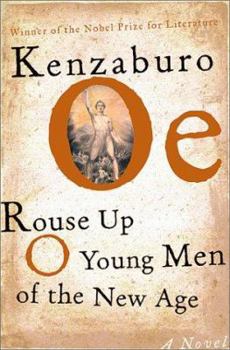Rouse Up O Young Men of the New Age!
Select Format
Select Condition 
Book Overview
Wise and illuminating, Rouse Up O Young Men of the New Age is a masterpiece from one of the world's finest writers, Kenzaburo Oe -- winner of the Nobel Prize for Literature. K is a famous writer... This description may be from another edition of this product.
Format:Hardcover
Language:English
ISBN:0802117104
ISBN13:9780802117106
Release Date:March 2002
Publisher:Grove/Atlantic
Length:259 Pages
Weight:1.00 lbs.
Dimensions:1.0" x 5.8" x 8.6"
Customer Reviews
4 ratings
Moving, Thoughtful, Layers of Meaning
Published by Thriftbooks.com User , 16 years ago
This is my fifth Oe novel, and I am always surprised at how one theme manifests in myriad fascinating plots. However, I am not surprised that he was the Nobel laureate in literature for 1994. Oe's writing is dominated by his decidedly masculine presence, but never loses itself in it. His descriptive language is eloquent without becoming mired in flocks of adverbs and adjectives (thanks also to a fine translation). In each of the novels I've read, a parent faces the challenges of a handicapped son, just as has Oe in real life. But in each of his fictitious works, the handicap varies and never duplicates his son's challenges nor the challenges of the characters in his other books. Rouse Up is a closer parallel to Oe's own experience than any of his other novels. It is decidedly autobiographical. No doubt he has used the novel format to cause some things to have a more satisfactory outcome than they may have had in real life. For instance, according to the Afterword written by translator John Nathan, Oe gives the fictional son a more robust ability to express himself than his real-life son. As Nathan describes it: "he is able to express himself in words, conveying wit and tenderness and compassion and his own brand of reductive wisdom about the world as he experiences it." Oe's real-life son, Hikari, has the gift of music. Though profoundly brain damaged, he has made his man's mark in the world as a celebrated composer. In an interview, speaking of Hikari's healing music, Oe commented, "My son's music is a model of my literature. I want to do the same thing." [...] Rouse Up is about fathers and sons, about the elation and disappointments of parenthood, about the joys and burdens of responsibility. Every son's father will find himself there. And, ultimately, like Hikari's music and Kenzaburo's prose, the journey is about healing.
More Rousing than Most Oe Novels
Published by Thriftbooks.com User , 18 years ago
Of the Oe novels I've read, this is one of the better ones in my opinion. A low key, understated spirituality suffuses this novel, and the narrator's engagement with the poetry of William Blake adds resonance and depth to Oe's prose (which otherwise often strikes me as okay but somewhat flat). While the work is fiction, it is crafted from events in Oe's real life and is thus more autobiographical than American readers may be comfortable with. This is a common feature of much Japanese fiction, as with the prewar I-Novels (shishosetsu) or the works of Shiga Naoya, though it is not an unknown phenomenon elsewhere--in fact, all fiction writers draw upon their own experiences to some degree. Here the degree is stronger, that's all. In any case, Oe has refined, sublimated, organized, and crafted his experiences into a fine, well-told story here. The afterword by the translator is okay but not very helpful, basically quoting long passages from the novel as if you haven't just finished reading it. A few good insights pop up there nonetheless. His translation work itself, though, is as far as I can tell quite excellent.
As much about poetic imagination as postwar Japan
Published by Thriftbooks.com User , 20 years ago
torn between a redemptive vision of culture and a globalizing hegemony of the right, this is a splendid and pithy novel that unlocks the sublime visionary power of William Blake (as revolutionary figure) to do global work inside post-imperial Japan and the US/Anglo hegemony. The son is caught between Blake the father and Los the son, and figures a way forward for all: Mutual Forgiveness is the Path to Eternity, said Blake to real politik. I love this novel, it taught me more about Blake and poetry than most poems I read, odd for a Japanese novelist to be tutoring this way!
floating
Published by Thriftbooks.com User , 21 years ago
As usual Mr. Oe's prose is sharp as a knife. As usual there is an odd humility (here in relation to the writings of William Blake). As usual we find ourselves thinking we are listening to the humble mumblings about some guy with a disabled child only to wake up somewhere quite different than we thought we were. As usual we read something entirely personal in its politic ...What left me reeling was the way this novel floats between the fact of Mr. Oe's life and the fiction that the novel is. Hmm. Read it.





